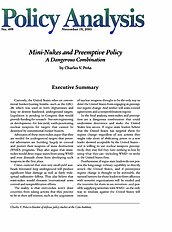Currently, the United States relies on conventional bunker-busting bombs–such as the GBU-28, which was used in both Afghanistan and Iraq–to destroy hardened, underground targets. Legislation is pending in Congress that would provide funding for research–but not engineering or development–for low-yield, earth-penetrating nuclear weapons for targets that cannot be destroyed by conventional bunker busters.
Advocates of these mini-nukes argue that they are needed for underground targets that potential adversaries are building, largely to conceal and protect their weapons of mass destruction (WMD) programs. They also argue that mini-nukes would deter rogue states from using WMD and even dissuade them from developing such weapons in the first place.
Critics contend that even very small-yield war-heads detonated deep underground will produce significant blast damage as well as fairly widespread radioactive fallout. They also believe that mini-nukes would threaten international arms control and nonproliferation efforts.
The reality is that mini-nukes won’t deter countries from taking actions that they perceive to be in their self-interest, such as the acquisition of nuclear weapons thought to be the only way to deter the United States from engaging in preemptive regime change. And neither will arms control agreements and a nonproliferation regime.
In the final analysis, mini-nukes and preemption are a dangerous combination that could undermine deterrence and make the United States less secure. If rogue state leaders believe that the United States has targeted them for regime change–regardless of any actions they might take short of abdicating power to a new leader deemed acceptable by the United States–and is willing to use nuclear weapons preemptively, they may feel they have nothing to lose by using what they can–including WMD–to strike at the United States first.
Furthermore, if rogue state leaders do not possess the long-range military capability to directly attack the United States, and if preemptive regime change is thought to be inevitable, the natural barriers for those leaders to form alliances with terrorist organizations will be eroded and the incentive for them to see terrorism–and possibly supplying terrorists with WMD–as the only way to retaliate against the United States will increase.

This work is licensed under a Creative Commons Attribution-NonCommercial-ShareAlike 4.0 International License.

